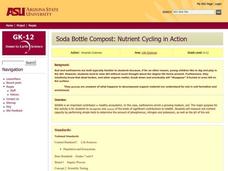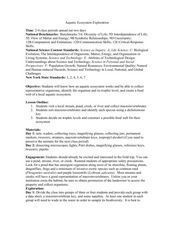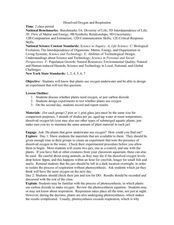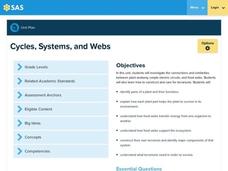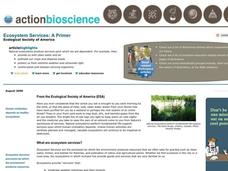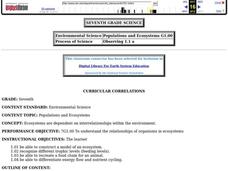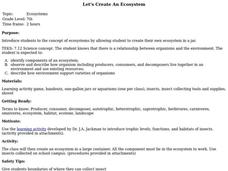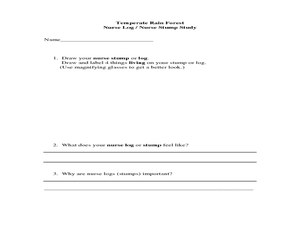Curated OER
Classroom Aquaponics: Exploring Nitrogen Cycling in a Closed System
Students investigate nutrient cycling in a simplified desktop ecosystem involving aquarium and hydro-ponically grown plants. They set up an aquarium with 10 gallons of water at least a week before the lab is planned and place...
Curated OER
Soda Bottle Compost: Nutrient Cycling in Action
Young scholars investigate, through their own experimentation, the important role wildlife play in nutrient cycling. Earthworms and compost are used in this experiment and different experimental setups be evaluated.
Science Matters
Matter Cycles — Sum It Up
Scholars become part of the cycle of matter with a reader's theater that showcases producers, consumers, decomposers, and the sun. A diagram and discussion concludes the learning experience and enhances comprehension.
Alabama Wildlife Federation
Forest Floor Investigation
Most living things go unnoticed. Change that using a fun activity about the nutrient cycle. Pupils use hula hoops to mark areas of study and then make observations about the living things they see. They first make surface observations,...
Curated OER
Aquatic Ecosystem Exploration
Young scholars visit a local stream, pond, creek, or river and collect macroinvertebrates. They sort macroinvertebrates and identify each species using a dichotomous key. Students decide on trophic levels and construct a possible food...
Curated OER
The Marvels of Mud
Young scientists roll up their sleeves and get a little dirty in this three-day earth science investigation. Following the scientific method, children monitor the growth of algae in pond water samples in order to determine...
National Park Service
Reduce Our Carbon Footprint, Let’s Compost!
Roll up your sleeves and get a little dirty with this elementary and middle school compost lesson plan. All you need is a large plastic container, a couple old newspapers, some organic waste, and a few hundred worms and you're ready...
Curated OER
Water Retention and Soil Variation in Local Ecosystems
Students identify the differences in local soil types and the relationship between soil size and water retention. They are introduced to microenvironmental conditions in ecosystem sustainability.
Curated OER
Dissolved Oxygen and Respiration
Students are presented with the question, "Do plants that grow underwater use oxygen?" They create an experiment to test the presence of dissolved oxygen in the water using provided materials. Student experiments include a control jar as...
Science Matters
Crawly Composters
Get your hands dirty with an interactive lesson that showcases the process of decomposing and returning nutrients back into the soil. After building a compost pile, pupils regularly observe the...
Pennsylvania Department of Education
Cycles, Systems, and Webs
Fourth graders review the parts of the plant and their functions. In this plant activity, 4th graders recognize that plants must transfer energy to make food. Students understand the interdependence of organisms in an...
Curated OER
How Much Is an Ecosystem Worth?
Students examine the value of ecosystems. They read and analyze an article, evaluate ecosystem services, research the benefits of biomonitors, and design a public service announcement.
Curated OER
Go With the Energy Flow
Students explore energy and nutrient flow. In this science instructional activity, students diagram the flow of energy through food chains and food webs. Students discuss the importance of energy flow in Earth's ecosystems.
Curated OER
Populations and Ecosystems
Seventh graders create a model of an ecosystem and label it to show structure and function. They research the food web of an aquatic animal and also trace energy flow from the primary producer up the food chain.
Curated OER
Bugs in the Woods
Second graders identify insects and plants in the forest ecosystem in a structured field trip with stations and activity booklets. In this bugs lesson, 2nd graders explore the ecosystem of the forest, complete the booklet and play...
Curated OER
Horticulture Crops in the agro-ecosystem
Ninth graders apply ecological analysis to fruit and vegetable production systems. In this horticulture activity students learn about different management practices.
Curated OER
Soil, Designer Soil: From Rainforests to the Prairie
Students explore the role and importance of soil in the ecosystem. In this Science and Social Studies lesson plan, students complete an experiment using various kinds of soil and clay and then examine how soil has a direct impact...
Curated OER
Let's Create An Ecosystem
Seventh graders create ecosystems in a jar which they observe over the course of the school year.
Curated OER
Let's Create an Ecosystem
Seventh graders discover how an ecosystem works by creating one in class. For this Earth science lesson, 7th graders study vocabulary terms associated with ecosystem and read environment handouts. Students create an...
Curated OER
Temperate Forest : Pacific Spirit Field Trip
Students examine nurse logs with hand lenses and identify animals. In this ecosystem lesson, students gain understanding of the rainforest by studying nurse logs. Students become familiar with vocabulary through their study...
Curated OER
Web of Life Game: Trout
Students explore the concept of food webs. In this food web lesson plan, students demonstarte the connection between species. Students use a ball of string show how the food web works, then have a class discussion.
University of Southern California
Mastering Microbes
Small but mighty! Learners explore the role of microbes in a healthy ecosystem. An engaging lesson asks pupils to design an aquaponics system that demonstrates that healthy microbes are necessary to maintain the ecosystem.
NOAA
The Dead Zone
The fifth installment of a 23-part NOAA Enrichment in Marine sciences and Oceanography (NEMO) program defines dead zones and how they form. Pupils then examine data from the Gulf of Mexico to determine dead zone formation.
Curated OER
Water Filtration
As an example of nature's water filtering system, young ecologists conduct an experiment in the lab. They construct a funnel out of a plastic bottle, fill it with specified layers of materials that simulate layers of soil, then run muddy...

